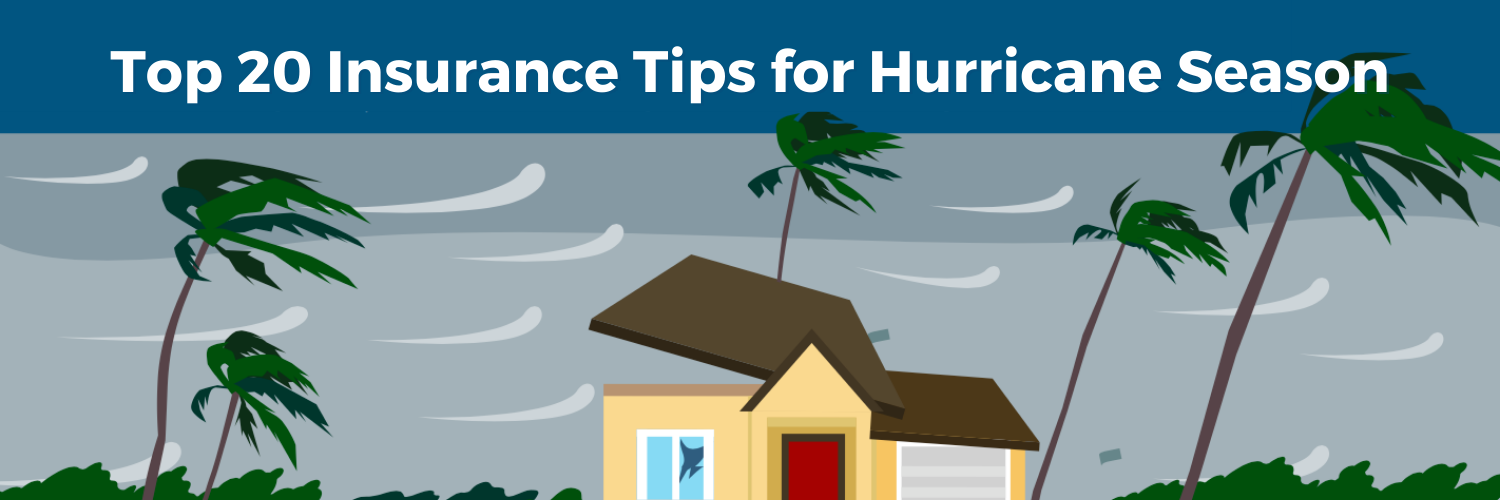
- MAKE A PLAN. Always the first step. Create a plan for how you will receive storm updates, where you will evacuate or take shelter, and how you will communicate with loved ones after the storm. Prepare for any special needs of those in your household or who might stay with you.
- KNOW YOUR RISK. Determine what damage a storm could do to your property based on its location and structure. Impacts of a storm can be felt from miles away. Consider strong winds, flooding rains, storm surge and tornadoes.
- REVIEW YOUR INSURANCE POLICY. Ask for an insurance checkup to make sure you have enough homeowners insurance to repair or replace your dwelling. And remember, the real estate value is not the same as the cost to rebuild.
- MAKE SURE YOU HAVE ENOUGH COVERAGE. Prices change over the years, including the value of your home. As you review your insurance policy, be sure to update your insurer on any recent renovations or improvements as well as any new personal items of value.
- DETERMINE WHETHER YOU NEED SPECIAL COVERAGE. Consider assets like your car, boat, RV or other expensive possessions that could be damaged during a storm and require unique insurance. You don’t want to find out too late that you didn’t have enough coverage.
- CONSIDER FLOOD INSURANCE. Remember, hurricane insurance is not flood insurance. Even homes in lower risk zones can experience flooding during a severe storm. Flood insurance may be available through your insurance company or the National Flood Insurance Program. Contact your agent or use the agent locator at FloodSmart.gov to learn more. But act soon, as flood insurance requires a 30-day waiting period.
- CONSIDER ADDITIONAL LIVING EXPENSE COVERAGE. A storm may force you to leave your home for a period of time. Additional living expense coverage may cover expenses such as motel, restaurant and storage costs.
- DO NOT WAIT FOR A STORM TO LOOK FOR INSURANCE. Once a hurricane is nearing the state, insurance companies will not accept new applications or requests for coverage increases. And remember the 30-day waiting period for flood insurance!
- HARDEN YOUR HOME TO WITHSTAND STORMS. Homes with stronger opening protections and reinforced roofs are better able to withstand storms. Take advantage of the new sales tax holiday for wind resistant doors, windows, and garage doors and update your home. You should be entitled to a discount on your insurance premium, and you will face a lower risk of catastrophic loss.
- UNDERSTAND YOUR HURRICANE DEDUCTIBLE. Hope for the best but plan for the worst. Separate from the standard deductible on your homeowners coverage, there may be an additional amount to pay out-of-pocket before your insurer will cover hurricane damage. Have this amount in mind, so you are prepared with an emergency fund or through a home equity line.
- INVENTORY YOUR POSSESSIONS AND THEIR VALUE. Create a list of your belongings and their corresponding value – this can be done by writing it down or simply taking pictures and videos with your phone. This helps during the claims process and provides proof of losses for tax or disaster aid.
- PREPARE YOUR FAMILY. Gather supplies for your family and pets, including food, water and batteries to last for two weeks. Develop and practice an emergency plan in the event you must quickly evacuate your home.
- PROTECT YOUR HOME. Assess your home’s vulnerabilities again as a storm approaches to prevent damage. Remove loose items and debris that could become hazardous during high winds.
- KEEP DOCUMENTS SAFE. Make copies of important documents – including your insurance policies – and note your hurricane deductibles. Include telephone numbers (including 24-hour contact information for your insurance company and agent). especially if the power goes out. Keep these documents in waterproof packaging (and be sure to keep more than one copy of your home inventory) in a safe location.
- CHECK ON NEIGHBORS. We are stronger together. As you prepare, reach out to those in your network or community who might need assistance with storm prep. Stay in touch, checking in before, during and after a storm.
- STAY INFORMED. Sign up to receive weather and emergency alerts through state and community information channels, including public safety updates via AlertFlorida.
- UNDERSTAND HOW TO FILE A CLAIM. In the event of a storm, if you need to file a claim, contact your insurer immediately as some insurers require notification within a certain time frame. View our infographic on the life of a hurricane claim.
- KNOW WHAT TO DO AFTER YOU FILE A CLAIM. Once you are able to safely return home after a storm, make sure you document any damage. Keep records of any temporary repairs costs, relocation costs and conversations with your insurer, adjusters or anyone making repairs on your home.
- MITIGATE DAMAGE TO YOUR HOME AFTER A STORM. Homeowners are obligated to do what they can to mitigate losses after a storm. If you leave your house after a storm and don’t take steps to mitigate further damage, you may find yourself at a disadvantage when seeking reimbursement for those losses. Most insurance companies will cover the cost of temporary repairs to keep your property from suffering further damages. Always follow evacuation and safety guidelines during this process.
- AVOID UNSCRUPULOUS REPAIR VENDORS. Promising free roofs or other quick repairs after a storm, some vendors may state that signing an “assignment of benefits” (AOB) is the only way to resolve an insurance claim without delay. However, this is not required for work to begin, and the AOB will actually transfer all rights under the insurance policy from the homeowner to the vendor, leaving you completely removed from your own claim process. Legislation was passed in 2019 to curtail predatory tactics by some vendors, but Floridians should remain wary of any promise of free goods or services after a storm.


